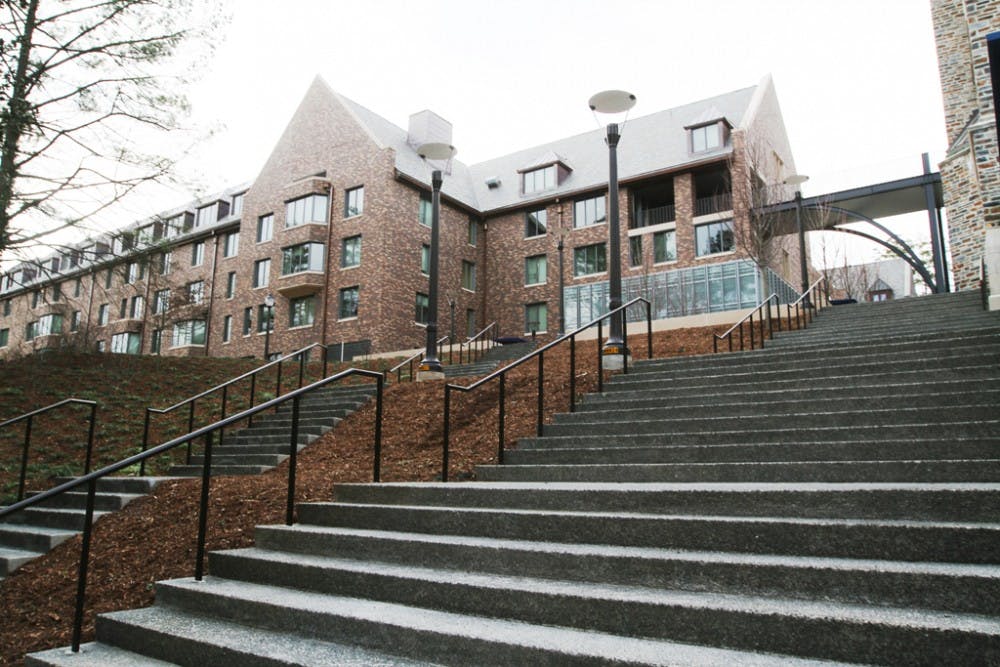When most students are elbowing their way onto the C-1, junior Megan Barron has to make alternate arrangements to make it to class on time.
Barron and other students with disabilities rely on the Duke Van Services to transport them to and from classes, extracurricular activities and social engagements. Barron, founder and president of the Duke Disability Alliance, said the van service is just one of Duke’s disability services that could be improved.
Last week, Duke Student Government unanimously passed a resolution challenging the University to make West Campus 100 percent handicap accessible by 2022. Following this meeting, Barron and sophomore Fedja Pavlovic, DSG senator for residence life and dining, began a series of meetings with the Facilities Management Department and the Disability Management System to achieve this goal.
“I want to see Duke be on the cutting edge of accessibility for any of the top-10 universities,” Barron said. “The resolution did great things as far as bringing awareness to the table, but it wasn’t exactly specific as to how to bring about such changes. I want to see the words turn into actions.”
The University has no official statistics regarding the number of students with disabilities because students have to self-report in order to receive special services, Leigh Fickling, executive director of the Disability Management System, wrote in an email Feb. 7. She noted, however, that Duke provides disability services to several hundred students each year.
Pavlovic, the author of the resolution, is optimistic about DSG’s short-term goals, which involve creating channels for communication between students and the administration to discuss problems with disability services on campus. One potential initiative is to create a website for filing complaints about broken or malfunctioning handicap services.
“[There is] this need to get some kind of means of communication between students and the administration,” Pavlovic said. “I don’t think anybody would expect [West Campus accessibility problems] to be resolved within the next semester or two because there’s just a lot of money involved.”
Disabled students face a number of challenges in everyday campus life, including the need for special building access, housing and transportation. Barron said the van service is often unreliable and difficult to use on weekends, especially for access to non-academic activities.
“I rely heavily on the van service, and I know it’s been a huge struggle just trying to get to class on time,” Barron said. “They’re really overbooked and don’t have enough drivers… What does that say? There is so much more than just getting to class and class-related activities.”
Transportation problems could be due to the implementation of the Americans with Disabilities Amendments Act in 1990, which might increase the number of students who define themselves as disabled, Samuel Veraldi, director of Parking and Transportation Services, wrote in an email Tuesday.
“Transportation is prepared to meet that demand and will adjust schedules and drivers accordingly,” he said.
The new house model is presenting additional challenges to students with disabilities, especially for those wishing to live with their selective living groups.
“I had a huge battle trying to get my housing because I need a special room with my own bathroom, and I’m also in a selective living group,” Barron said. “The house model doesn’t really allow for much flexibility in terms of places students can live who have special needs.”
Housing, Dining and Residence Life plans to make more rooms handicap accessible, including apartments on Central Campus, said Joe Gonzalez, associate dean for residence life.
“The reality is our current system had the same challenges in terms of SLGs,” he said. “The transition to Duke houses just increases the number of locations where we might face those obstacles.”
The Disability Management System, which guides the University in accommodating people with disabilities, has both short and long-term goals for improving Duke’s disability services, Fickling said. In April, the office plans to host a nationally recognized disability consultant who will conduct training sessions for Duke’s disability service liaisons. Disability Management System staff will also attend conferences and web seminars to stay updated on changes to disability laws and federal acts.
Barron noted that the Duke Disability Alliance recently launched a public service campaign to raise awareness about the challenges of being disabled on Duke’s campus.
“It’s time to go from the promise of making Duke better to real results on campus,” Barron said. “The resolution was a great start, but I really want to see more.”
Get The Chronicle straight to your inbox
Signup for our weekly newsletter. Cancel at any time.

